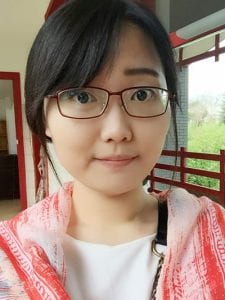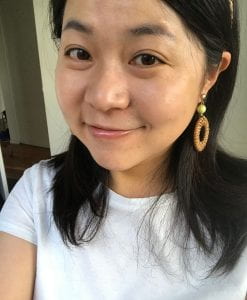Team
The Plant-Fusarium Interactions Research Team:
Marc Somssich
Marc @ Google Scholar: https://scholar.google.com.au/citations?user=-YhIzdMAAAAJ&hl=en
Marc @ Twitter: https://twitter.com/somssichm
Marc @ Mastodon: @somssich@sciencemastodon.com
Marc @ ORCID: https://orcid.org/0000-0001-5092-6168
Marc @ ResearchGate: https://www.researchgate.net/profile/Marc_Somssich
Liu Wang
 Liu studied food biotechnology at China Agricultural University in Beijing, China. For her Master’s thesis in the lab of A/Prof. Lin Shen she studied the drought stress response in tomato, establishing CRISPR-Cas9-mediated genome editing of tomato in her lab. Feeling the pressure to publish a first-author paper from her thesis, she somewhat overshot the mark and published three within a year. Having generated CRISPR-Cas9-edited tomato lines for different MAPKs to build the lab’s future research on, co-authorship on several future papers was secured and she therefore decided to move on. After receiving a PhD-scholarship from the Chinese Scholarship Council, she joined Prof. Staffan Persson’s Plant Cell Biology lab at the University of Melbourne to study salinity tolerance in plants, thereby building on her experience studying drought tolerance, but switching from the cool tomato plant to the general model Arabidopsis thaliana. Taking over a project from Marc, and being co-supervised by Staffan and Marc, she was automatically usurped by the newly formed Plant-Fusarium Interactions Research Team. For her work, Liu focuses on the role of the COMPANION OF CELLULOSE SYNTHASE 1 (CC1) protein in maintaining cell wall synthesis under salt stress, and how it connects cellulose synthesis activity to cytoskeleton-dynamics. Furthermore, she has quickly become the resident expert for protein-immunoprecipitation experiments with subsequent proteomic analyses, creating protein-protein-interaction and phosphoproteomic data resources for the lab, thereby enabling new student projects and once again ensuring her place on the author list of several upcoming papers.
Liu studied food biotechnology at China Agricultural University in Beijing, China. For her Master’s thesis in the lab of A/Prof. Lin Shen she studied the drought stress response in tomato, establishing CRISPR-Cas9-mediated genome editing of tomato in her lab. Feeling the pressure to publish a first-author paper from her thesis, she somewhat overshot the mark and published three within a year. Having generated CRISPR-Cas9-edited tomato lines for different MAPKs to build the lab’s future research on, co-authorship on several future papers was secured and she therefore decided to move on. After receiving a PhD-scholarship from the Chinese Scholarship Council, she joined Prof. Staffan Persson’s Plant Cell Biology lab at the University of Melbourne to study salinity tolerance in plants, thereby building on her experience studying drought tolerance, but switching from the cool tomato plant to the general model Arabidopsis thaliana. Taking over a project from Marc, and being co-supervised by Staffan and Marc, she was automatically usurped by the newly formed Plant-Fusarium Interactions Research Team. For her work, Liu focuses on the role of the COMPANION OF CELLULOSE SYNTHASE 1 (CC1) protein in maintaining cell wall synthesis under salt stress, and how it connects cellulose synthesis activity to cytoskeleton-dynamics. Furthermore, she has quickly become the resident expert for protein-immunoprecipitation experiments with subsequent proteomic analyses, creating protein-protein-interaction and phosphoproteomic data resources for the lab, thereby enabling new student projects and once again ensuring her place on the author list of several upcoming papers.
Liu @ Google Scholar: https://scholar.google.com/citations?user=W209SQoAAAAJ&hl=en&oi=sra
Liu @ Twitter: https://twitter.com/Liu_Wang1
Jacob Calabria
 Jacob studied genetics for his bachelor’s degree at the University of Melbourne, and subsequently completed his Master’s thesis in the Drosophila lab of Dr. Michael Murray. For his project he identified genes regulating the mesenchymal to epithelial cell transition during development of the Drosophila melanogaster embryo midgut, as this cell transition is important not only for normal embryo development, but also has relevance for tissue repair and cancer metastasis. Following his time in the genetics department, Jacob assumed the role of a research technician for both, Prof. Staffan Persson’s Plant Cell Biology lab and Dr. Berit Ebert’s Plant Glycobiology lab, in order to gain more practical experience working in a molecular biology lab. He quickly earned a reputation as a highly skilled, talented and motivated technician, thereby qualifying to also work for Marc’s Plant-Fusarium Interactions Research Team. As part of the Team, one of Jacob’s main objectives is to establish a transformation protocol for canola, in order to obtain fluorescent marker lines.
Jacob studied genetics for his bachelor’s degree at the University of Melbourne, and subsequently completed his Master’s thesis in the Drosophila lab of Dr. Michael Murray. For his project he identified genes regulating the mesenchymal to epithelial cell transition during development of the Drosophila melanogaster embryo midgut, as this cell transition is important not only for normal embryo development, but also has relevance for tissue repair and cancer metastasis. Following his time in the genetics department, Jacob assumed the role of a research technician for both, Prof. Staffan Persson’s Plant Cell Biology lab and Dr. Berit Ebert’s Plant Glycobiology lab, in order to gain more practical experience working in a molecular biology lab. He quickly earned a reputation as a highly skilled, talented and motivated technician, thereby qualifying to also work for Marc’s Plant-Fusarium Interactions Research Team. As part of the Team, one of Jacob’s main objectives is to establish a transformation protocol for canola, in order to obtain fluorescent marker lines.
Hsiang-Wen Chen
 Hsiang-Wen is interested in plant movement, such as tropisms and nastic movements, but especially circumnutation, which is involved in shoot climbing and soil penetration of the root. Her fascination with this topic motivated her to pursue a career in plant science, when she studied Biology at National Taiwan University, where she completed her Master’s thesis in the lab of Asst.Prof. Shu-Jen Wang in the Department of Agronomy. For her thesis, she focused on root movements in Oryza sativa, studying the hormone signalling pathways that control the light-induced wavy-root morphology seen in some varieties, and how environmental stimuli alter circumnutation patterns of seminal roots. Following the completion of her work, she moved on to the lab of A/Prof. Shih-Long Tu at the Institute of Plant and Microbial Biology, Academia Sinica, to expand her skill set by working as a research assistant before starting her PhD-studies. With A/Prof. Tu she helped to identify molecular mechanisms of light-regulated alternative splicing in Physcomitrium patens (or, TMFKAPhyscomitrella patents) using RNAseq. At this point, with research experience in two different labs, two first-author publications and plenty of experience with a variety of molecular biology methods and techniques, Hsiang-Wen decided to pursue her PhD-studies in Prof. Staffan Persson’s Plant Cell Biology lab at the University of Melbourne, via the university’s Graduate Research Scholarship program. Here, she returned to her original research-interest of studying plant movement, by investigating the role of the microtubule-binding protein CELLULOSE-MICROTUBULE UNCOUPLING 1 (CMU1) in control cell wall integrity during root skewing and soil penetration. Since her work is heavily dependent on live cell microscopy, using Spinning Disc and AiryScan Laser Scanning confocal microscopes, Staffan and Hsiang-Wen recruited Marc as co-supervisor for her PhD, making her a member of the Plant-Fusarium Interactions Research Team.
Hsiang-Wen is interested in plant movement, such as tropisms and nastic movements, but especially circumnutation, which is involved in shoot climbing and soil penetration of the root. Her fascination with this topic motivated her to pursue a career in plant science, when she studied Biology at National Taiwan University, where she completed her Master’s thesis in the lab of Asst.Prof. Shu-Jen Wang in the Department of Agronomy. For her thesis, she focused on root movements in Oryza sativa, studying the hormone signalling pathways that control the light-induced wavy-root morphology seen in some varieties, and how environmental stimuli alter circumnutation patterns of seminal roots. Following the completion of her work, she moved on to the lab of A/Prof. Shih-Long Tu at the Institute of Plant and Microbial Biology, Academia Sinica, to expand her skill set by working as a research assistant before starting her PhD-studies. With A/Prof. Tu she helped to identify molecular mechanisms of light-regulated alternative splicing in Physcomitrium patens (or, TMFKAPhyscomitrella patents) using RNAseq. At this point, with research experience in two different labs, two first-author publications and plenty of experience with a variety of molecular biology methods and techniques, Hsiang-Wen decided to pursue her PhD-studies in Prof. Staffan Persson’s Plant Cell Biology lab at the University of Melbourne, via the university’s Graduate Research Scholarship program. Here, she returned to her original research-interest of studying plant movement, by investigating the role of the microtubule-binding protein CELLULOSE-MICROTUBULE UNCOUPLING 1 (CMU1) in control cell wall integrity during root skewing and soil penetration. Since her work is heavily dependent on live cell microscopy, using Spinning Disc and AiryScan Laser Scanning confocal microscopes, Staffan and Hsiang-Wen recruited Marc as co-supervisor for her PhD, making her a member of the Plant-Fusarium Interactions Research Team.
Hsiang-Wen @ Google Scholar: https://scholar.google.com/citations?user=N6-uOeAAAAAJ&hl=en
Hsiang-Wen @ Twitter: https://twitter.com/HsiangWen_Chen
Cooperations:
Staffan Persson
Our team originated from Staffan’s lab here at UniMelb, and Liu and Hsiang-Wen are co-supervised by Staffan, are working on projects from his lab, and are accordingly supported by him.
Alexander Idnurm
Since none of us are experts in Mycology, or know how to handle pathogenic fungi, we are lucky to have the Mycology Team of A/Prof. Alexander Idnurm housed in our School of BioSciences building. Alex and his team are not just general experts for fungi, but are a leading lab for plant pathogenic fungi. Their main focus lies on Leptosphaeria maculans, the causal agent of blackleg disease in canola, for our joined project, however, they are more than happy to work with Fusarium oxysporum and have already created a whole suit of fluorescent marker lines for us to work with.
Biological Optical Microscopy Platform (BOMP)
A big part of the work in our team is based on fluorescent microscopy. Accordingly, BOMP is an important partner for us at the University. They provide us with modern, serviced microscopes, as well as image analysis software, know-how, trainings and workshops.
